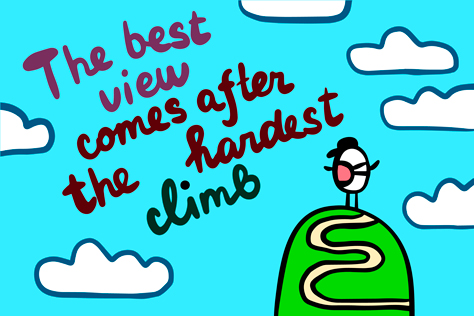
No matter how many goals you say you have or how you write them out, unless you have the motivation to achieve them – you won’t.
“Motivation is the driving force behind the energy required to complete a task… a person’s willingness to exert physical or mental effort in order to complete a goal or set aim. (Psychology Dictionary.org)
This is a key element in a Goal Driven Business.
You first need to define your goals – and they must be practical as well as meaningful. But you also need the drive to achieve them. Without the drive, the motivation to get to where you want to go, you are just a poser in the business world.
(Case #345) The doctor and I had discussed a plan to motivate his team and increase production. This was many years ago. Over lunch, we had a team meeting to announce the plan to his other two doctors and about 10 support staff. He announced that if certain goals were met over the next 7 months, everyone could get a trip to Hawaii.
Everyone was shocked. Including me! The doctor and I had discussed a two-month plan for rewards based upon a modest performance improvement – but not Hawaii and not the increase in production he wanted. He came up with this on the spot during our meeting.
But that afternoon, amazingly, the phones lit up. People were calling in for appointments. (Never mind that this was an example of Innate or Quantum Entanglement!) As I recall, they had their best month ever. But unfortunately, they soon realized that the goals were unrealistic, they had little support to achieve them, and the doctor saw that he couldn’t afford it even if they did reach their goals. The practice subsequently went into a long-term slump.
==================================================================
What is the lesson? Well, there are a few of them, but I want to focus on motivation.
While it may seem like people become motivated because of the “carrot,” or the reward, there are deeper reasons – or principles.
Edward Deci, along with others, put forth a new framework for motivation called Self-Determination Theory. Essentially, it states that we are all driven by intrinsic goals as part of our fundamental nature. Our reward comes from the satisfaction we feel from the achievement more than from any external prize.
These are the three intrinsic goals we all share:
AUTONOMY. We all want to play in our own sandbox! We need to feel in control of our own corner of the world. Just like we don’t like insurance companies intruding into our clinical decisions, staff does not like being micromanaged.
COMPETENCE. We all want to be superheroes! Deep down, the prospect of becoming more skilled, more masterful, and better able to be in control of our environment is a drive we all have.
CONNECTION. We all want to be part of something bigger than ourselves. This manifests in two ways: a) being part of and working with a supportive group or team, and b) working to help bring about something more significant than our paycheck or the accomplishment of our everyday tasks.
The office staff was excited to go to Hawaii, but this was not necessarily because they could lie in the sun. It was because it was a huge goal that gave them a very large sandbox to play in – together – to work for a very large result.
Self-Determination Theory is why games work. In Kevin Werbach book, For the Win, he discusses the subject of Gamification.
“For thousands of years, we’ve created things called games that tap the tremendous psychic power of fun. A well-designed game is a guided missile to the motivational heart of the human psyche. …monetary rewards aren’t even necessary because the game itself is the reward.”
Whether it is a sporting event, video game, or Sheepshead (a popular game of old-time Wisconsinites, so I’ve heard), we love our games. And I think we need them.
But it all goes back to the principles of Self-Determination Theory.
Remember when you started your business? The challenge that lay ahead? The new business card that identified you as the hero to conquer new plateaus?
Those drives are still there and can be rekindled, regardless of prior disappointments.
As Soon as You Make a Goal—You Have Created the Potential for a Game.
Win or lose, IF the principles of Self-Determination Theory are in place, you will be motivated and so will those with whom you work.
Apply these principles to yourself and your team – for the game, for the fun, and for the win!
Seize the Future,
Ed
For more information on how to apply self-Determination Theory, games, and motivating yourself and your team, please purchase the book,
The Goal Driven Business. [Link to sell page]
